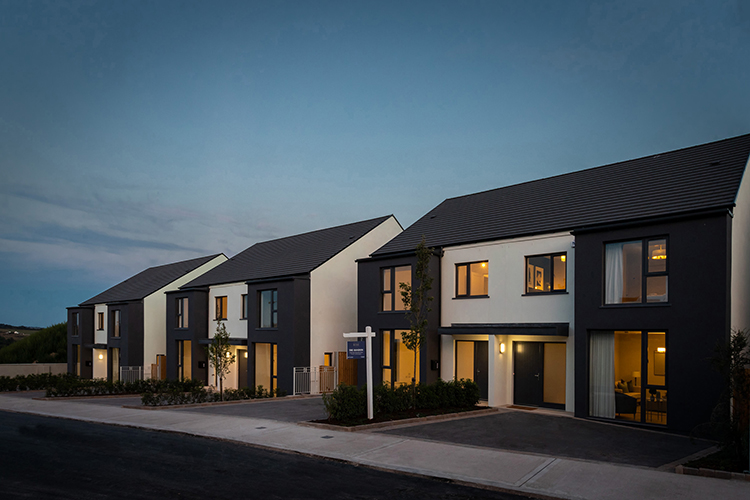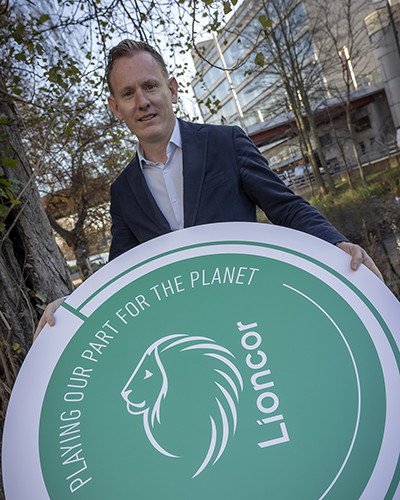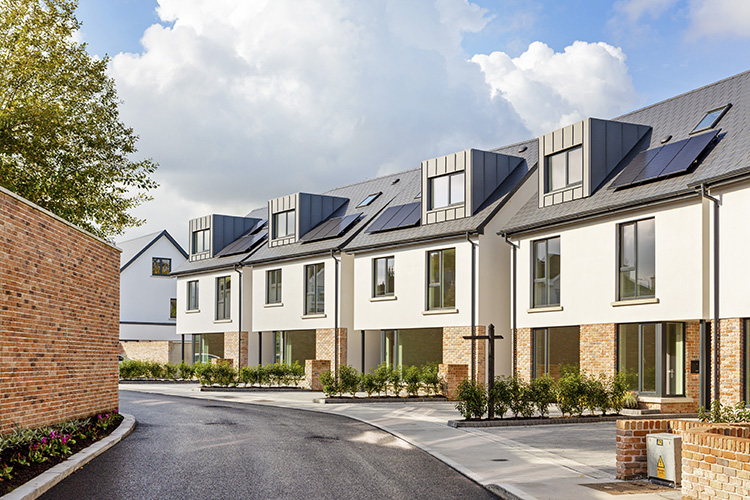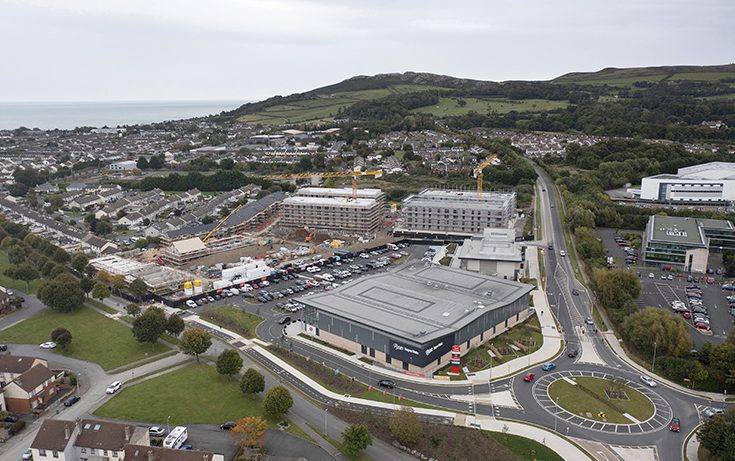“Our goal is to leave a meaningful legacy on the physical landscape of Ireland”


Lioncor CEO and #BuildingLife Ambassador John Maxwell speaks with ROBBIE COUSINS about the Irish Green Building Council’s Roadmap to decarbonise Ireland’s built environment and the changes that need to be made to halve Ireland’s built environment emissions by 2030.
The Irish Green Building Council’s (IGBC’s) #BuildingLife campaign aims to achieve a broad range of private sector actions and public policy changes that will be required to tackle the whole-life environmental impact of buildings.
Launched back in December 2020 in the run-up to COP26, the idea behind the #Building Life Campaign was to shine a spotlight and tackle the carbon effect from construction, both embodied and operational. The idea was to bring representatives from across various sectors, both public and private, to produce a science-based and industry-backed roadmap for national decarbonisation.
Sustainability
An integral part of the campaign is the appointment of #BuildingLife ambassadors. The role of these ambassadors is to champion #BuildingLife goals and help drive change around sustainability across the construction industry.
Speaking about his role as an IGBC #BuildingLife ambassador, John Maxwell, CEO of property developer Lioncor, says that as a father of three, he feels compelled to try to undo some of the harm done to the planet and to do all he can in this role to leave a better place behind and help move the Irish building stock to a more sustainable footing.
“One of the most appealing parts of being involved in the #BuildingLife campaign is that it brings together diverse representatives from across the entire sector to find science-based and industry-backed solutions, such as the national decarbonisation roadmap for the built environment currently being finalised,” John Maxwell comments.
“We understand the negative effects of the carbon emissions the built environment creates. Construction and real estate are amongst the highest emitters of carbon in the world. Approximately 37% of all carbon emissions in Ireland are generated from the construction industry and the built environment. The heating, cooling and lighting of our buildings account for 23% of our national emissions, with the remaining 14% being attributable to embodied carbon according to the Roadmap.
“With these stats in mind, we are very cognisant of the part we can play in the various phases of construction from sourcing raw materials through to transport, construction, operation and, in some cases, demolition. The #BuildingLife campaign provides a platform for cross-sectoral collaboration where we can have an influence on reducing the carbon footprint of the built environment.”
The initial success of the #BuildingLife campaign will be the soon-to-be finalised Roadmap to decarbonise Ireland’s built environment, which will provide a new framework for how the industry operates and will influence new green legislation.
“The introduction of a new roadmap will require further education and training in the industry to ensure awareness and compliance and encourage ‘green’ skills,” Maxwell comments. “We believe in the upskill and build capacity within the industry to ensure the policy ambitions of the Roadmap can be met. We believe the campaign is vital to give a better understanding of what’s needed across the industry.
“On a personal note and as a father of three,” he adds, “I feel compelled to try and undo some of the harm that has been done to the planet and to do all I can in this role to leave a better place behind than the one we started with. This is a huge challenge, but one that we all need to work on across our industry and all industries.”
About Lioncor
Lioncor was established in 2018 with a view to becoming one of the top residential developers in Ireland. John Maxwell explains that as a new company in the space, it has no negative legacy issues, and its management team has scaled the business relatively quickly in the short life of the company.
“We pride ourselves in delivering housing to all cohorts of the market, from starter homes to social housing, and from luxury apartments and houses to build-to-rent developments. We have delivered homes throughout the country with seven active developments in Dublin, Wicklow, Limerick and Cork. Our new homes pipeline can potentially deliver in excess of 7,000 homes, with a large percentage of these linked to the Glass Bottle site on Sandymount Strand, Dublin 4, and other south Dublin suburban locations.
“At Lioncor, we have an experienced, dynamic and passionate team of construction, finance, legal and property professionals who are committed to building highly efficient homes on development sites well connected to the local amenities and communities surrounding them.”

Environmental social governance criteria
John Maxwell maintains that Environmental Social Governance (ESG) is integral not only to the Lioncor business but to the real estate industry as a whole, and it plays a key part in the development of all Lioncor sites.
“ESG now defines how we and our assets are valued,” he explains. “We are passionate about playing our part in taking care of the planet, our people and the communities in which we work. Our goal is to leave a meaningful legacy on the physical landscape of Ireland.
Going “Beyond the baseline”
When it comes to sustainability and reduction of carbon emissions, John Maxwell comments that Lioncor goes “beyond the baseline”.
“We use the phrase beyond the baseline because we are honest about the fact that Irish building regulations are already amongst the highest in Europe, ensuring that new buildings are increasingly low energy, meeting nearly-zero energy building (nZEB) standards. Our planning system also enforces good social practices, such as external stakeholder engagement.
“Lioncor’s ambition is to move beyond what is already a strong baseline to drive best practice in our industry.”
EU Taxonomy
In January of this year, the EU introduced the EU Taxonomy for Sustainable Activities. The EU Taxonomy is a classification system that establishes a list of environmentally sustainable economic activities. It could play an important role in helping the EU scale up sustainable investment and implement the European Green Deal.
Lioncor has set a target of achieving alignment with the Climate Change Mitigation environmental objective of avoiding significant human interference with Earth’s climate under the new EU Taxonomy.
John Maxwell explains that this means that all Lioncor developments are designed to be 10% better than nZEB, achieving the target of carbon neutrality for new construction activities, as defined by the EU.
“This target is meaningful for all of our stakeholders, simultaneously making our homes more sustainable for our communities. As part of these efforts, we are investing in Climate Change Risk and Vulnerability assessments, whole-life cycle assessments, disassembly and adaptability modelling and several other initiatives, which inform and guide our design and construction efforts from the earliest stages.
“During construction, we will be engaging a system of activities that are designed to minimise the energy performance gaps, ensuring that our buildings meet our expectations. We will also be engaging in post-occupancy evaluation in our efforts to continually monitor, measure and improve our buildings’ performance.”
Towards sustainable construction
John Maxwell believes that the Irish construction industry as a whole is acutely aware of the drive toward minimising carbon emissions and the consequent design and specification requirements that this entails.
“We believe that like all other business sectors, Irish contractors are working towards best practises in ensuring that they play their part in reducing carbon emissions, helped by our strict building regulations and the already mentioned introduction of EU Taxonomy regulations in January of this year.
“Strong overall ESG performance, including the reduction of carbon emissions, requires Irish contractors to implement policies and strategies that account for all of the environmental, social, and governance aspects of their operations, and we believe Irish contractors are wholly aware of their obligations.”
Key sustainability challenges
While Irish construction may be on board with the goal of reducing carbon emissions, there are challenges.
“One of the biggest challenges we see in reducing whole-life carbon emissions is the lack of data on carbon emissions. Currently, emissions in Ireland are poorly quantified. Standard digitalisation is necessary at every stage of asset delivery to ensure a reduction in both embodied and operational carbon.
“The increased costs involved in low carbon construction will also be challenging.
“Finally, reducing whole-life carbon requires efforts from all stakeholders throughout the life cycle process, from designers to product manufacturers, to contractors, subcontractors and right through to the end-users. It’s vital that everyone in the value chain works together to ensure we achieve the end goal of net zero by 2050. We need cross-sectorial whole-life carbon commitments.”

Planning
On top of these challenges, there is also the question of whether the Irish planning system is fit for purpose.
“The number one challenge for Irish developers today remains planning, but this is currently closely followed by build cost inflation. Our system is not fit for purpose; personal interest and nimbyism remain massive issues.
“The ultimate solution to high rents and high property prices is to increase supply, and that includes the supply of all housing tenures. But, sadly, I believe that message has been lost. Too many people are focused on self-interest rather than national interest. Our economy is starting to suffer from a lack of competitiveness, and this comes back to cost of living challenges for employees, much of which is linked to housing costs. It always comes back to supply. supply, supply; It is simple economics.”
Following the Roadmap
John Maxwell says that Lioncor is committed to constructing developments so that they have a net positive climate impact through whole-life cycle analysis, sustainable procurement, application of circular economy principles, resource management and the enhancement of the natural environment.
“We very much back the Roadmap to decarbonise Ireland’s built environment and applaud all those who invested their time in the workshops and assisted in creating the draft map. The Roadmap takes into account all aspects of the built environment from design, planning, construction and location and professes the need for cross-sectorial cooperation, which we believe is vital to achieving targeted reductions.
“We note a red flag in relation to decarbonisation skills or “green” skills and the necessity to invest in education. We believe this upskilling is not only for higher education settings but also needs to occur at boardroom level.”
John Maxwell says that it is vital that the planning process is streamlined and reviewed in terms of any new climate policy, and that there is a necessity to take a good look at possible changes to financial contributions tied to low-carbon buildings. He also notes that the role of local authorities also needs reviewing.
Upskilling, incentivisation and innovation
“Education and upskilling are also not only important at ground level but also for those working within the government and at local authority level. To make the right decisions, we need the relevant expertise and manpower across all government departments.
“We need to incentivise the reuse and redevelopment of our existing building stock. Ireland has one of the highest rates of abandoned, unused and underused housing in the world. A nationwide review of the existing housing stock is needed to have a full understanding of what needs to be done.
“We also need to ensure that green building materials are incentivised, and to that effect that green buildings that perform in a highly efficient manner are encouraged through financial reward, ie, there is a financial incentive to build better.”
He also believes that it is essential that further innovation and R&D into more sustainable building practices and the SMART use of buildings on completion is encouraged.
“We must embrace technology to ensure we build and use our buildings in the most sustainable ways possible.”
Lioncor outlook
In closing, John Maxwell says that from a Lioncor perspective, he is excited about upcoming opportunities, but he notes that nothing is ever straightforward when it comes to property development.
“Hopefully, it will be business as usual in the coming year. There are no straight lines when it comes to development; there will always be the unforeseen and challenges, which is what makes the job so interesting.
“We are very excited to be commencing works on the Glass Bottle site this year and some of our other sites around Dublin. Despite the challenges of inflation and the other clouds on the horizon, the outlook is bright. I am an optimist at heart; you have to be in this game,” he concludes.




